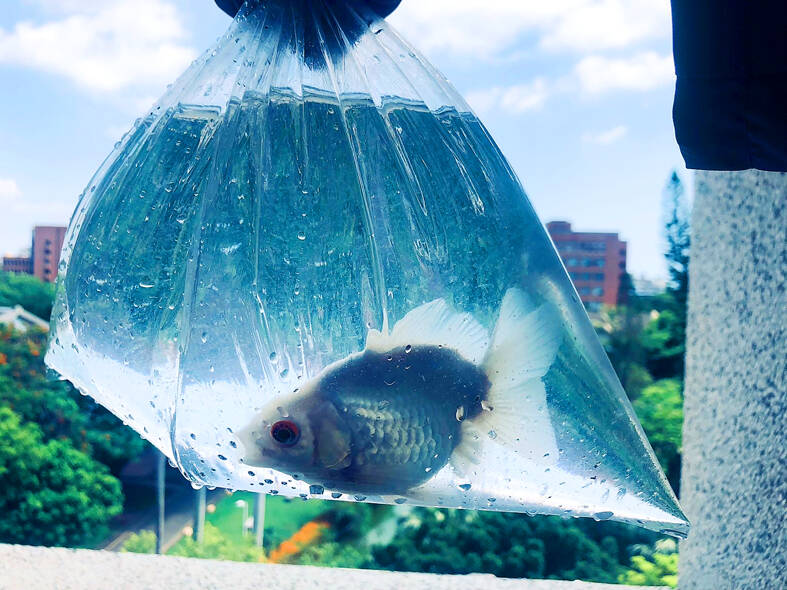A professor at National Taiwan University apologized on Wednesday for any emotional distress he might have caused with an “experiment” in which a goldfish was put into a blender, and a volunteer was asked to turn it on, during one of his summer classes for high-school students.
Lai Chung-hsiung (賴俊雄), a distinguished professor in National Cheng Kung University’s (NCKU) Department of Foreign Languages and Literature, issued the apology amid public criticism over the incident during the class on Monday at the summer camp on humanities.
In a post on the Internet forum Dcard, one of the high-school students said that Lai had failed to clearly explain in advance the purpose and procedure of the “experiment,” which resulted in some students crying and leaving the classroom.

Photo courtesy of Lai Chung-hsiung’s research office
“It was crazy. He was not doing an experiment with us. He was doing an experiment on us,” the student wrote.
On Wednesday, Lai released a statement through NCKU in which he explained that the “experiment” was based on Helena, an art installation at Denmark’s Trapholt museum in 2000, which featured a line of blenders containing goldfish and was reported on by the BBC.
In that instance, one of the visitors actually pushed the button on the blender, resulting in the deaths of two goldfish and a lawsuit filed by local animal rights advocates.
However, a court ruled that as the fish had died instantly, the installation did not constitute animal abuse, Lai said.
According to the artist, the purpose of the installation was to force people to wrestle with their conscience and test their sense of right and wrong, Lai said.
In his own summer course he asked a teaching assistant to pour water into a blender and check to see if it was working, Lai said.
He then dropped a goldfish into the water, and at that point, he asked any students who were uncomfortable with the experiment to leave the room, Lai said.
When Lai asked for a volunteer, a male student came forward and pressed the button, unaware that the blender would not work as the teaching assistant had covertly unplugged it, he said.
At that point Lai explained to the class the history and purpose of the experiment, before segueing into a broader discussion of the students’ views on the value of life, he said.
He said 20 of the estimated 200 students in the class had opted to leave the room before the experiment and the subsequent discussion, which was why there were some “misunderstandings” about what had actually taken place.
Lai said he apologized for his failure to consider the emotional distress some students might have suffered as a result of the experiment.

An essay competition jointly organized by a local writing society and a publisher affiliated with the Chinese Communist Party (CCP) might have contravened the Act Governing Relations Between the People of the Taiwan Area and the Mainland Area (臺灣地區與大陸地區人民關係條例), the Mainland Affairs Council (MAC) said on Thursday. “In this case, the partner organization is clearly an agency under the CCP’s Fujian Provincial Committee,” MAC Deputy Minister and spokesperson Liang Wen-chieh (梁文傑) said at a news briefing in Taipei. “It also involves bringing Taiwanese students to China with all-expenses-paid arrangements to attend award ceremonies and camps,” Liang said. Those two “characteristics” are typically sufficient

A magnitude 5.9 earthquake that struck about 33km off the coast of Hualien City was the "main shock" in a series of quakes in the area, with aftershocks expected over the next three days, the Central Weather Administration (CWA) said yesterday. Prior to the magnitude 5.9 quake shaking most of Taiwan at 6:53pm yesterday, six other earthquakes stronger than a magnitude of 4, starting with a magnitude 5.5 quake at 6:09pm, occurred in the area. CWA Seismological Center Director Wu Chien-fu (吳健富) confirmed that the quakes were all part of the same series and that the magnitude 5.5 temblor was

The brilliant blue waters, thick foliage and bucolic atmosphere on this seemingly idyllic archipelago deep in the Pacific Ocean belie the key role it now plays in a titanic geopolitical struggle. Palau is again on the front line as China, and the US and its allies prepare their forces in an intensifying contest for control over the Asia-Pacific region. The democratic nation of just 17,000 people hosts US-controlled airstrips and soon-to-be-completed radar installations that the US military describes as “critical” to monitoring vast swathes of water and airspace. It is also a key piece of the second island chain, a string of

The Central Weather Administration has issued a heat alert for southeastern Taiwan, warning of temperatures as high as 36°C today, while alerting some coastal areas of strong winds later in the day. Kaohsiung’s Neimen District (內門) and Pingtung County’s Neipu Township (內埔) are under an orange heat alert, which warns of temperatures as high as 36°C for three consecutive days, the CWA said, citing southwest winds. The heat would also extend to Tainan’s Nansi (楠西) and Yujing (玉井) districts, as well as Pingtung’s Gaoshu (高樹), Yanpu (鹽埔) and Majia (瑪家) townships, it said, forecasting highs of up to 36°C in those areas